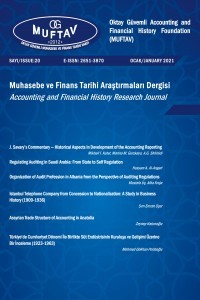Cumhuriyet’in Muhasebe Düşüncesi - Batılılaşma Sürecinin Üçüncü Evresi- (1923-1950)
Tanzimat (1839) ile başlayan mali ve idari reformlar içinde Türk muhasebe düşüncesinin batı Avrupa ile entegrasyonu da yer almıştır. Cumhuriyet’e kadar yapılanlar, ticarette İslami kuralların geçerli olması dolayısı ile fazla etkili olamamıştır. Cumhuriyet devrimleri, Tanzimat ile başlayan batılılaşma sürecini yeniden başlatmıştır. 1923-1950 Yılları arasında muhasebe düşüncesini etkileyen üç akım olduğu gözlenmektedir. Bunlardan ilki, vergilerin beyan usulü ile alınmaya başlanması nedeni ile muhasebenin önem kazanması ve muhasebenin denetim ağırlıklı gelişmesidir. İkincisi, 1933 -1939 yılları arsındaki sanayileşme hamlesi ile oluşturulan iktisadi devlet teşekküllerinde, Alman işletme mühendislerinin danışmanlığı ile geniş bir alanda gerçekleştirilen muhasebe uygulamalarıdır. Üçüncüsü ise, Cumhuriyet’in muhasebe akademik kadrolarını, iktisadi devlet teşekküllerinde yetişenlerin desteği ile oluşturan akımdır. Bu akım, yüzyılın ikinci yarısında Türk muhasebe akademisyenlerinin temelini oluşturmuş, yönünü belirlemiştir. 1950 Yılı sonrası izlenen liberal iktisat politikaları ile iktisadi devlet teşekküllerinin muhasebe düşüncesindeki etkisi zayıflamış ve vergi muhasebesi öne çıkmıştır.
Anahtar Kelimeler:
Türk muhasebesinin batı ile entegrasyonu, Cumhuriyet dönemi muhasebesi.
(Accounting Thought of the Republic - Third Stage of the Westernization Process (1923-1950)
Financial and administrative reforms that began with the Imperial Edict of 1839 (Tanzimat) involve the integration of the Turkish accounting thought with the western European countries. The actions until the establishment of the Republic were not effective due to the influence of Islamic rules within commercial activities. Revolutions of the Republic restarted the westernization process that initially began with the Tanzimat. It is observed that three tendencies effect the accounting thought of the Republic between the years 1923 and 1950. First one is the increasing importance of accounting because of new taxation practices based on declaration, and the development of auditing. The second one is the accounting practices initiated within public economic enterprises as part of the industrialization movements with the aid of German management engineers between the years 1933 and 1939. The third one is the movement initiated by the new accounting academicians of the Republic. The aid of the newly raised professionals to the academicians is observed as a significant factor. These movements can be considered as the basis of Turkish accounting academicians and thus directed their way. Liberal economy politics after 1950s weakened the influence of public economic enterprises on Turkish accounting thought and paved the way for tax accounting practices.
Keywords:
Integration of Turkish accounting thought with western European countries, accounting in the Republic era.,
- ISSN: 2146-4928
- Yayın Aralığı: Yılda 2 Sayı
- Başlangıç: 2011
- Yayıncı: Oktay Güvemli Muhasebe ve Finans Tarihi Vakfı (MUFTAV)
Sayıdaki Diğer Makaleler
Cumhuriyet’in İlk Döneminde Muhasebe Düşüncesine Katkı Verenler: Abdullah Nuri Aker (1905 - 1977)
Conference: Pacioli 2017 (Project)
Uluslararası Muhasebe ve Denetim Standartlarının Gelişmesi
Muhasebe Teori Ve Uygulamalarından Beklentiler 2
YÜKSEK TİCARETLİLER DERNEĞİ 80 YAŞINDA (1936 – 2016)
Masum Türker, İpek TÜRKER, Muhsin ASLAN
MUFTAV’dan Mesaj İŞLETME VE MUHASEBECİNİN YALNIZLIĞI - TİCARET VE SANAYİ ODALARINA DÜŞEN GÖREVLER
Türk Muhasebe Tarihçilerinin Uluslararası Aktivitelerde Sundukları Bildiriler (2000 - 2016)
Prof. Dr. Oktay Güvemli Eserlerinin Yayın Hakkını MUFTAV'a devretti
